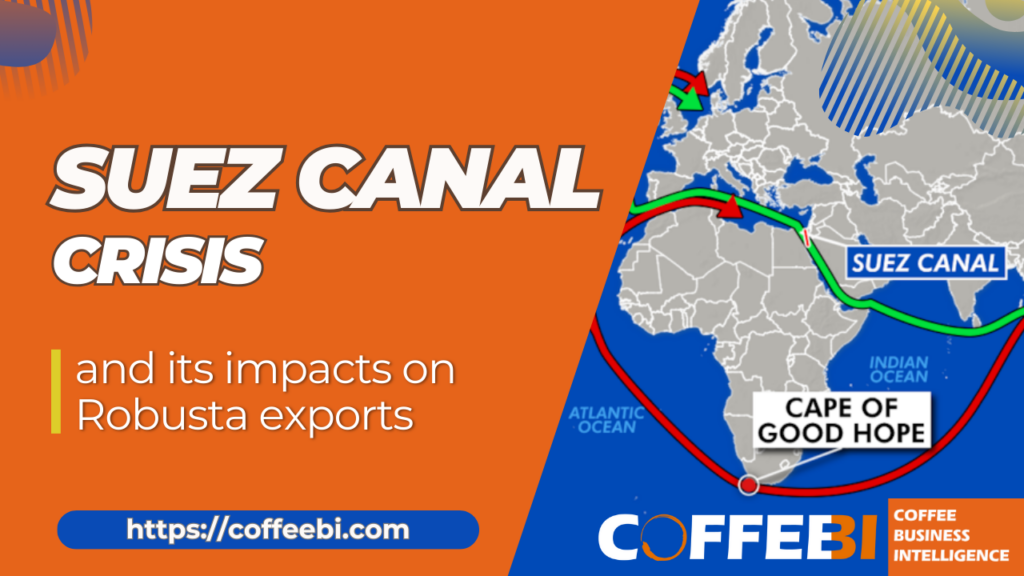The Suez Canal crisis and its impacts on robusta exports
The Suez Canal is still a crucial maritime artery that connects the Mediterranean Sea to the Red Sea and Indian Ocean. It plays a pivotal role in global trade, especially for Robusta exports from Southeast Asia to Europe.
Recent disruptions, such as the temporary closure in 2021 caused by the blockage of the Ever Given container ship, or the increasing incidents of piracy in the area in 2023, have raised concerns about the vulnerability of this crucial waterway.
These interruptions could have a significant impact on the coffee trade, particularly the exportation of robusta coffee from Southeast Asia to Europe.
Countries like Vietnam and Indonesia are major players in the global coffee market, exporting substantial quantities of coffee beans, particularly Robusta, to Europe and the USA. The closure of the Suez Canal could impact this intricate supply chain, affecting farmers, exporters, and consumers alike.
Transportation Challenges and increasing Costs

The Suez Canal is a crucial route for shipping coffee from Southeast Asia to Europe. The closure of this waterway, even temporarily, could force shipping companies to seek alternative routes, leading to longer transit times and increased transportation costs. This, in turn, might translate into higher prices for consumers in importing countries and reduced profits for exporters. Based on historical shipping data and industry analyses, a rough estimate might suggest that the cost could increase from 5% to 15% or more.
The ongoing crisis poses a significant threat to the stability of Robusta prices, which has already been evident in the recent price hikes. 2023 has served as a clear demonstration of this trend. To gain a better understanding of the price fluctuations, you can refer to the following reliable source: here.
Supply Chain Disruptions and Economic impacts
Other indirect costs should be considered**: the coffee supply chain is highly time-sensitive, and any delays can impact the quality of the beans**. Prolonged disruptions due to a closed Red Sea may result in logistical challenges, affecting the timely delivery of coffee to its destination. This could lead to potential quality degradation, impacting the Southeast Asian coffee in international markets.
Export-dependent economies, heavily reliant on income generated from coffee sales, could face economic setbacks. The livelihoods of small-scale coffee farmers and workers along the supply chain may be at risk, exacerbating the social and economic challenges already faced by these communities.
Moreover, the heightened risks associated with longer and alternative routes may also lead to increased insurance premiums for the transportation of robusta coffee.
Beyond logistical and financial considerations, the uncertainties introduced by the Suez Canal crisis could contribute to market fluctuations in the robusta coffee trade, influencing prices and overall trade dynamics. The impacts extend beyond immediate challenges and encompass broader aspects of the coffee industry.
Alternative transportation routes
In response to the potential risks associated with reliance on the Suez Canal, coffee-producing nations in Southeast Asia may consider to explore diversification strategies and risk mitigation measures.
The alternative routes could include the Cape of Good Hope Route: instead of passing through the Suez Canal, ships navigate around the southern tip of Africa, known as the Cape of Good Hope, to reach European ports. This route is particularly beneficial for ports on the western side of the continent, such as Portugal and Spain.
A less probable option is to use the Panama Canal Route: ships travel through the South China Sea, cross the Pacific Ocean, and enter the Panama Canal. They then proceed through the Caribbean Sea and the Atlantic Ocean. This route is typically used for shipments to the Americas, but the journey can be extremely long to reach Europe.
As of October 1, 2023, the ICO composite indicator price for Robusta coffee stands at an average of 108.02 US cents per pound, marking a modest uptick from the preceding month’s average of 106.93 US cents per pound. This increase is reflective of the dynamic factors shaping the Robusta market, where global demand for soluble coffee plays a pivotal role alongside reduced supplies from key producing nations.
Noteworthy contributors to the production of Robusta coffee include countries such as Vietnam, Brazil, and Indonesia. However, the ongoing Red Sea crisis has introduced a potential shift in the landscape, which could favor South American exports to Europe. The crisis’s impact on the Suez Canal may lead to logistical challenges and disruptions in the supply chain, potentially creating opportunities for South American coffee producers to meet the increased demand in the European market. Market participants will closely monitor these developments for their implications on the global coffee trade. Already, there is a trend showing that Arab nations imported 56.2 percent more coffee from Brazil in the first half of 2023 than during the same period in 2022, according to the data from the Brazilian Council of Coffee Exporters (Cecafe).


